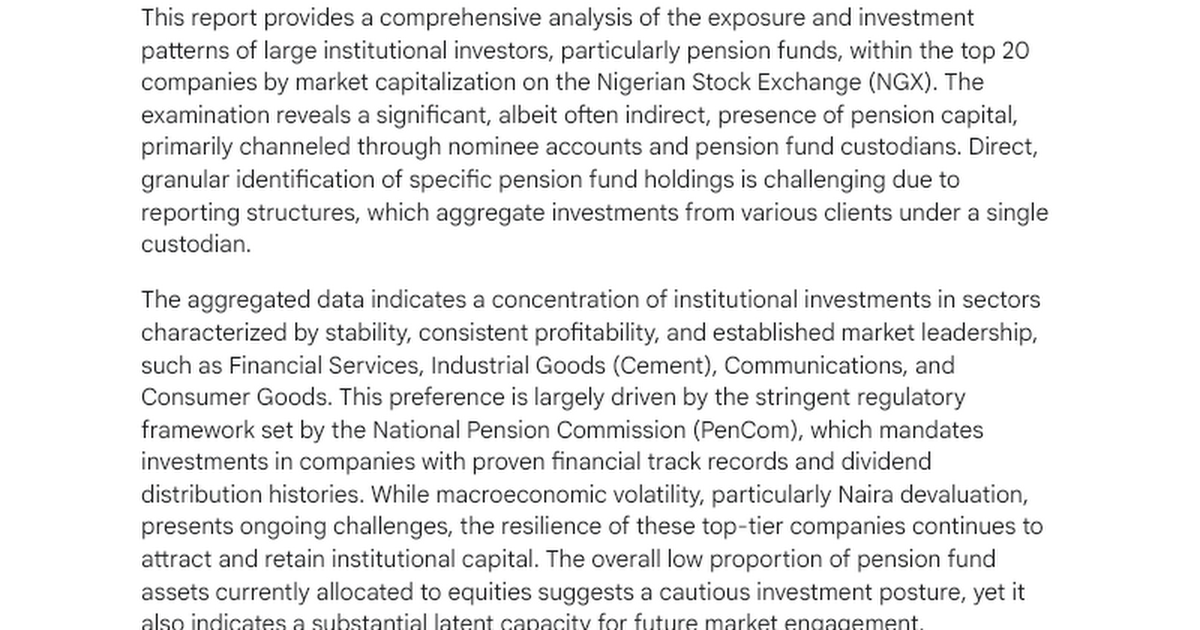Big Capital in Nigeria
Passing thoughts on institutional investors in Nigeria

There's no doubt that capital–read: cash–is available and deployable in Nigeria. For this note though, I'm interested in capital deployed on the Nigerian Stock Exchange, by institutional investors.
There can be several categories of 'institutional investors'–holding companies, foreign investors, venture capital, and stock-broking houses amongst others. I'm interested in conservative capital: insurance firms, pension houses, mutual funds, etc.
My interest stems from understanding what the long-term outlook of these firms are and learning from it. I am a conservative investor myself–very intentional about exploring and benefitting from compounding interests. I researched said category of investors for a little bit and came to an underwhelming result.
My 'research' here was entirely carried out by Google Gemini Deep Research. I thought about and specified what exactly I would have done (albeit much slower) and it gave me the results (more comprehensive than I would have had the time and resources to accomplish).
What I wanted to do
- I was going to make a list of the top companies on the NSE: conservative capital will prefer large cap, stable businesses
- Find out the top investors in said companies: businesses publish largest investors in annual reports
- Highlight the 'conservative capital' investors I saw and try to tally their investments
- If I know the companies they're invested in and how much they invested, I can use that as an indicator of the industries/businesses they trust
This was my actual prompt:
Here's a PDF of the completed research, if you wish:
Here's the link to the Google Doc:

My takeaway
A rough list of things I learned, in no particular order:
- The outsized ownership of pubic companies by their founders does not really translate to 'public' companies. Examples: ~95.78% of BUA Group (Cement & Foods) is owned by Abdul Samad Rabiu, Dangote owns 85.8% of Dangote.
- The pension regulator does not highly recommend equities as an investment vehicle to Pension Fund Administrators
- Pension Fund Administrators (19 of them) do not hold contributed assets. They are actually held by Pension Fund Custodians (3 of them)–they act like central banks to the commercial banks (PFAs)
- Here, I wonder about the monetary costs of such arrangements and the eventual duplicated movement of funds (of course, the risks of letting PFAs hold their funds must have been judged to be higher than the cost). I also wonder how PFAs make money (do they simply take a cut off investment profits?)
- The structure of PFCs in holding assets on behalf of PFAs stump me in two ways:
- I cannot see the actual involvement of individual PFAs–e.g I cannot see if GTPensions is making some advantageous investment
- I have to assume that, to a significant extent, PFAs implement similar strategies
- The unenthusiastic participation of pension funds (my proxy for 'conservative capital') in the stock market leaves me with little to work with. If I am really particular about 'conservative', I would have to pay more attention to bonds and funds.
...
To provide a broader context, it is necessary to refer to industry-wide data from PenCom. As of July 2022, the total Assets Under Management (AUM) of Nigerian pension funds stood at N14.36 trillion. Of this, the domestic equity exposure was reported at 6.4%.3 This translates to an estimated N919 billion 1 invested in domestic equities by pension funds.
–From Google Gemini Deep Research
What next
If it is not so straightforward to get data from a pubic stock exchange, I imagine it will be even more tricky to analyse the books of pension companies, and insurance companies in extension.
I'll keep a note of other big capital: investment houses, venture capital, non-financial firms, and that's without excluding pension and insurance.
Big capital shape our economy just as much as small businesses do. I intend to pay attention, follow the money, and build the future.
Links



